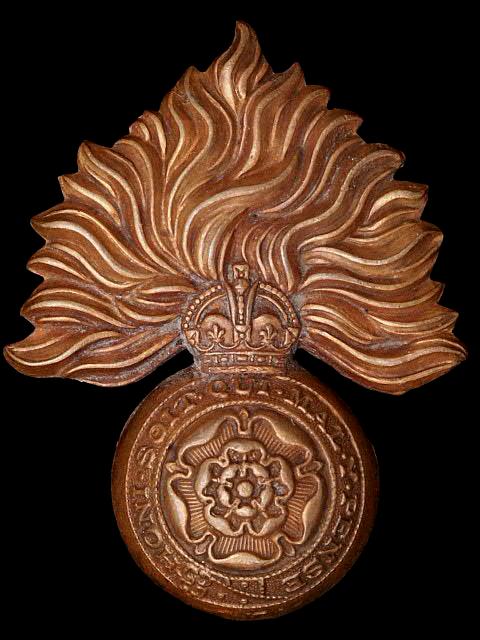
Albert Edward Benjamin Rickards

then
Royal Fusiliers
7th Battalion
Lance Corporal 16379
 |  | |
| 3rd The King's Own Hussars then Royal Fusiliers 7th Battalion Lance Corporal 16379 | ||
| Died 11th April 1918 |
Albert Rickards' Parents | ||
|
Albert Edward Benjamin Rickards was one of only two children born to Albert Rickards (senior) and Ellen (née Holland). Albert Rickards (senior) Albert (sen) was born in London, the seventh of ten children. Their father was an umbrella maker but died before Albert (senior) was 10 years old. The family lived in the east end of London, with addresses in Whitechapel (1871 census) and Bethnal Green (1881). By 1891, when Albert (senior) was 20, he had moved to Bath and the census lists him as living as a lodger at 2, Manvers Place. This address used to be on the north side of what is now Orchard Street, roughly where the entrance to the Marks & Spencer delivery area is. Another lodger, Charles Hawkins of Clifton, was also lodging at the same address. He and Albert (sen) were both ‘portmanteau makers’; it is likely that they worked together. Ellen Holland 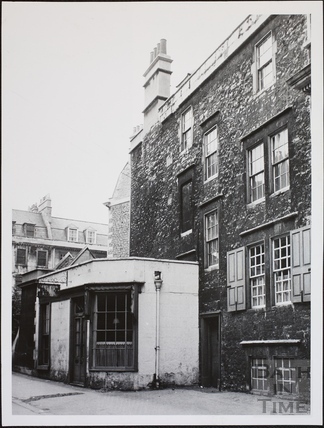 10 Hetling Court, seen here in 1964. This was the childhood home of Albert's mother Ellen. The building no longer stands. [Image: Bath In Time] | ||
|
In 1891 the census lists Ellen Holland as a domestic parlour-maid
at a house called Rosslyn Villa in Park Gardens, in what is now called Weston
Park |
The Rickards Family |
|
Albert (sen) and Ellen married at Bath Register Office in
1893. Their daughter Beatrice was born in 1894 and Albert (jun) in 1896. Perhaps due to the expanded family, or because they could afford to move to their own home, the Rickards relocated to Oldfield Park. |
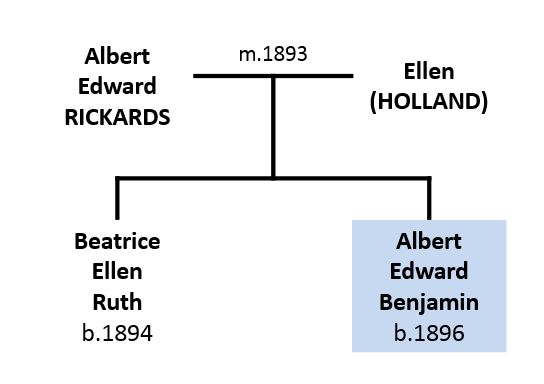 |
|
During the 1890s, the area then known as South Twerton
(around West Avenue, Herbert Road etc. and now part of Oldfield Park) was being
built. The Rickards family therefore moved into the area when it was a
‘new-build’ estate. The Bath Directory
shows the family living at 4 Claude Avenue (1897) and then at 18 Cynthia Road
(1901) and 6 Lyndhurst Road (1902-5). Newspaper reports of the early 1900s show Albert's sister Beatrice among the
prize recipients at the newly-built (1902) Oldfield Park Baptist Church and
receiving her Grade 1 pianoforte certificate from the Bath Society of
Musicians. Several pieces of information point to the fact that the family were regulars at the Baptist church. The Rickards luggage business first appears in the Bath Directory
at 17 Union Passage (was 'Arcania' until recently) in 1905, with the family also
listed in the Directory as living at this address here. In 1907, the premises on the corner, 11
Union Passage (later re-numbered 11 Northumberland Passage), became the new home for the business. |
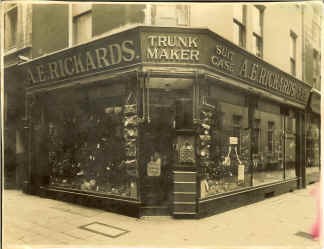 | ||
|
The Rickards business carried on at 11 Union Passage for over 100 years (although sold by the Rickards family many years before), closing in 2014. |
|
The results of the 1908 Scripture Exams published in the
newspaper reveal that Albert (jun), now living in the city centre, was attending
Manvers Street Sunday School, but Beatrice was still active with the Oldfield
Park Baptist Sunday School in 1911. In the same year, on the occasion of the
Coronation of King George V, when a civic procession was held, their father Albert (sen)
represented the Bath Sunday Schools Union. By 1910, the Bath Directory listing for Albert Rickards (sen) is ‘Portmanteau maker, 11 Union Passage, residence ‘Stover’, Bloomfield Road’. ‘Stover’, named after a country seat in Devon, was a detached residence on the western side of Bloomfield Road, just above the junction with Englishcombe Lane.
'Stover', now 162 Bloomfield Road It appears that
the
owners of Westfield House (the large house on this corner plot) began
selling
parcels of its land for development at around this time and that
‘Stover’ was
built on one such plot (the whole street of Westfield Close was later
built on
a more extensive portion of the Westfield House grounds). ‘Stover’
would probably have
been new built when the Rickards took possession. This move to a large,
detached
residence is indicative of the success of the Rickards luggage-making
business. In common with many owners of businesses at that time,
Albert Rickards (sen) was also engaged in civic life. He was an active supporter of the local
Conservative party, and was mentioned in 1908 as having been in charge of the
motor vehicle that formed part of the electioneering process in that year. In
1911, he stood for office as Liberal candidate for Lyncombe (which included the
area in Bloomfield Road where the family lived) in the local elections. He came
last, but the newspaper of the time relates his cheery good humour in the face
of defeat: Mr Rickards said “I must thank the electors of Lyncombe Ward for putting
me at the bottom of the poll (loud laughter). I am sure it has been a very fair
and straight fight. Although we have lost, we are not disheartened, especially
considering the circumstances under which we fought. Next time, if we fight
again, no doubt we shall try to do better than we have done this time!
(cheers)”. Also in 1911, when the congregation of the Odd Down Mission
church (later to become St Philip & St James) presented a leather robe case
to their departing vicar, the case was made by Rickards. The 1911 census showed all four family members’ professions
as being involved in the business. In addition to his interests in the business, political and
church life of the city, Albert Rickards (sen) took a keen interest in sport.
In 1912, he made a presentation to the departing organiser of the Oldfield Park
Baptist Athletic Club (including a portmanteau!) and in the same year he
facilitated the installation of new tennis courts ‘on the site of the old
Griffin Works’.
These are now part of the Wansdyke Business Centre on Oldfield
Lane and the tennis courts were roughly where St John's school's
all-weather sport pitch is. Beatrice, meanwhile, was also engaged in sporting pursuits, representing Bath Dolphins Swimming Club. Albert (jun) was turning out for Oldfield Park Baptist football team (playing alongside my great uncle George Nixey! – JB). 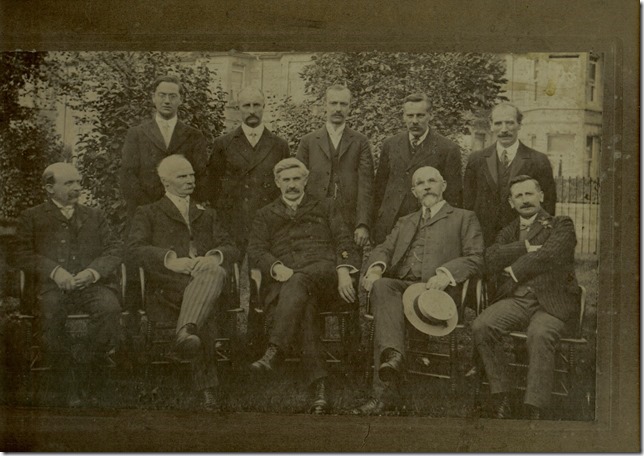 The leadership of Oldfield Park Baptist Church in 1913. Albert Rickards (sen) is top right. [Many thanks to Simon Rogers for this and other old Rickards photos used here.] Being a pillar of the community did not prevent Mr Rickards from being fined 5 shillings in 1913 for obstructing Union Passage. Policemen of the time were very strict on such offences, with fines sometimes issued to shopkeepers if their outdoor displays encroached on the footway, or if they were too slow to take deliveries into their premises. We know that Albert (jun) joined the family business prior to the outbreak of war. |
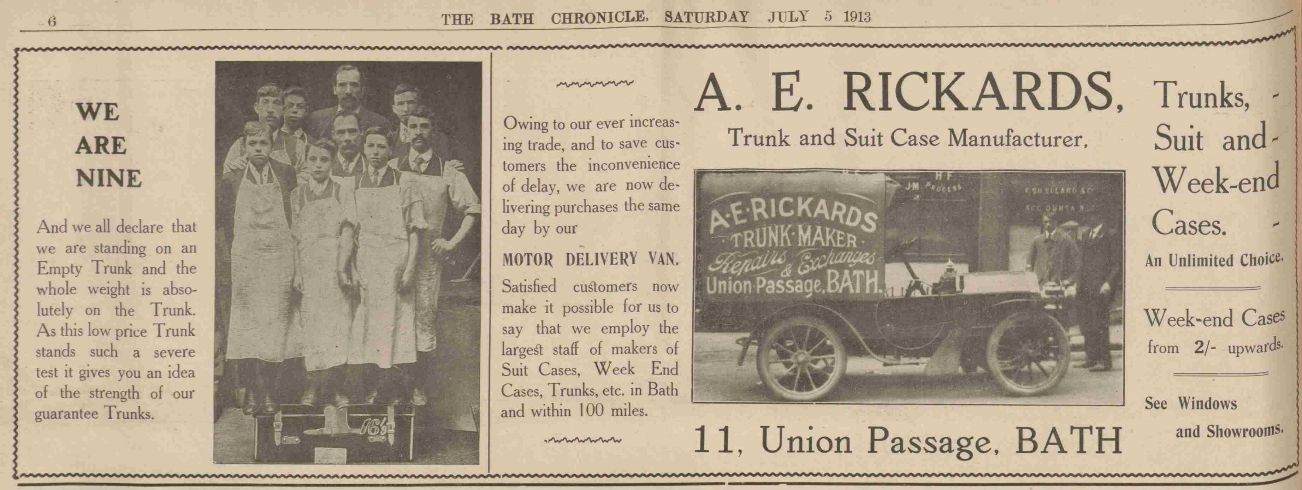 | ||
| A 1913 advertisement for the Rickards company. The man at the centre rear of the left-hand photograph is Albert Rickards senior. |
Albert Rickards in WW1 | ||
3rd The King's Own Hussars & the Royal Fusiliers We know (from the Bath Chronicle announcement of his death) that Albert enlisted in 1914 with the 3rd Hussars (4th Cavalry Division) at Shorncliffe in Kent and that he later transferred to the 7th Battalion, Royal Fusiliers. We need to undertake more research about Albert's movements during the war, especially as there is also mention of his having been injured at the landings at Suvla Bay, part of the Gallipoli campaign. The problem is that neither the 3rd Hussars nor the 7th Battalion of the Royal Fusiliers were deployed to Gallipoli. So there are other circumstances that we need to understand in order to have a good idea what Albert did in the war. 1915In 1915 we know that Albert was involved in the Suvla Bay landings as part of the Gallipoli campaign, where he was 'slightly wounded', according to a later newspaper comment. The landings took place in August 1915. The report then states that he was in hospital in Cairo for seven months, which would take us through to spring 1916. Events Back at Home: 1915-1916 Back at home, we know that Albert's sister Beatrice married in 1915 in Bath and became Beatrice Stone. One wonders whether Albert managed to come home on leave for the wedding prior to being posted to Greece. The Rickards luggage business was carrying on its
business, which was significantly affected by the war: the large scale movement of
people caused by the war increased demand for suitcases, trunks etc., but the absence
of men of working age through military service made it difficult to recruit a
work force. Regular adverts appeared for girls to work at ‘Hope Works’, the
former ‘Hope Chapel’, which is still in existence next to St James Park
(‘Pigeon Park’) on Lower Borough Walls. 
Girls at work on the rivetting machines in the Rickards factory in Hope Chapel. Note the shape of the windows... compared with this external view of Hope Chapel from St James' Park, today (below)
Advertisements for staff appeared increasingly regularly in
the local press, and moves were also afoot to hang on to staff who might
otherwise have gone to serve in the armed forces. Tribunals were held regularly
to decide whether or not certain men must heed the call to military service.
Many appeals against the draft came from the men themselves, who cited
financial or other grounds (such as dependent family members) as a reason why
they could not serve. Such appeals were also sometimes submitted by employers
who made claims of the indispensable nature of some employees. Here is the
report from the Bath Chronicle & Weekly Gazette of Saturday 26th August
1916: ON GOVERNMENT CONTRACTS. A. Rickards, 11 Union Passage, applied for W. J. Morrell (39), 6
Charmouth Road, leather cutter. He said he had sixteen men in his employment
before the war; now he had only two men and a boy and 100 girls. Morrell would
be practically working altogether on a Government contract for two months.
Colonel Clayton said he should not object to exemption while Morrell was
employed on war work. Certificate [of exemption issued] for three months, on
condition that the man works three-quarters of his time on Government orders. Albert’s father was also in the news again in 1916 for obstructing the highway in Lower Borough Walls with his car. It was only a certain class of person who had a car in 1916; Mr Rickards was clearly a well-to-do businessman! 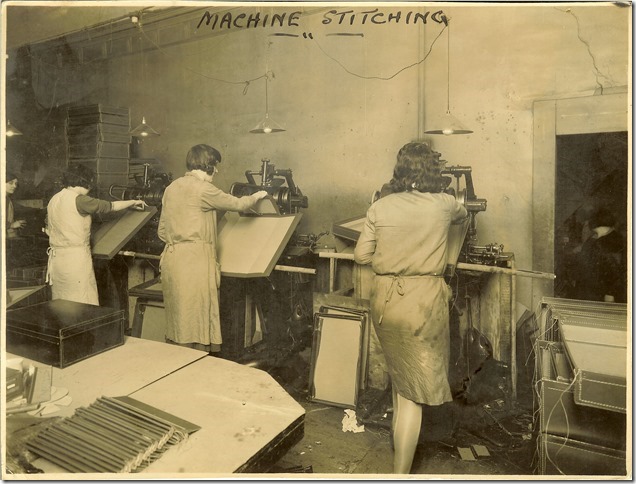 Above: Girls at work using the stitching machines in the Rickards works Below: Men cut the fibre boards that form the basis of the cases 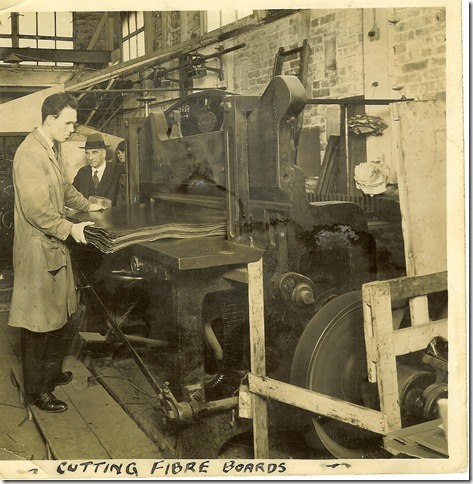 1916: The Battle of the Somme We know that Albert was involved in the Capture of Trônes Wood, an action that took place as part of the Battle of the Somme in July 1916. But we don't know what unit he was with at this point. Events Back at Home: 1917 In February 1917, the captain of Bath City football club,
Arthur Crump, was killed in service. The notice in the Bath Chronicle &
Weekly Gazette stated that Crump had been apprenticed at Rickards’ and was in
their employment when he enlisted for military service. It is not known how
many other employees of the company were killed in service. 1918We don't know when Albert tranferred
between units, but at the time of his death he was serving with the 7th
Battalion, the Royal Fusiliers. | ||
Albert Rickards' Death | ||
| Albert was killed on 11th April 1918. The news of Albert’s death was reported in the Bath Chronicle & Weekly Gazette of 20th April 1918: 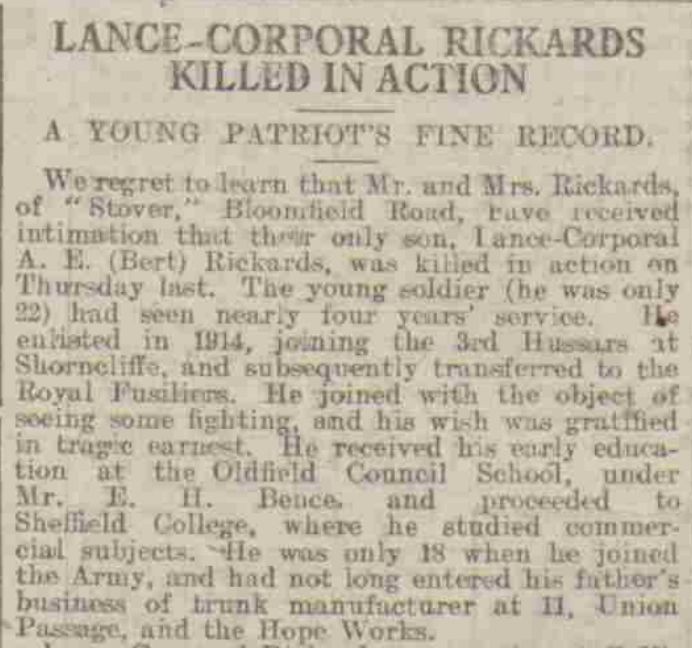 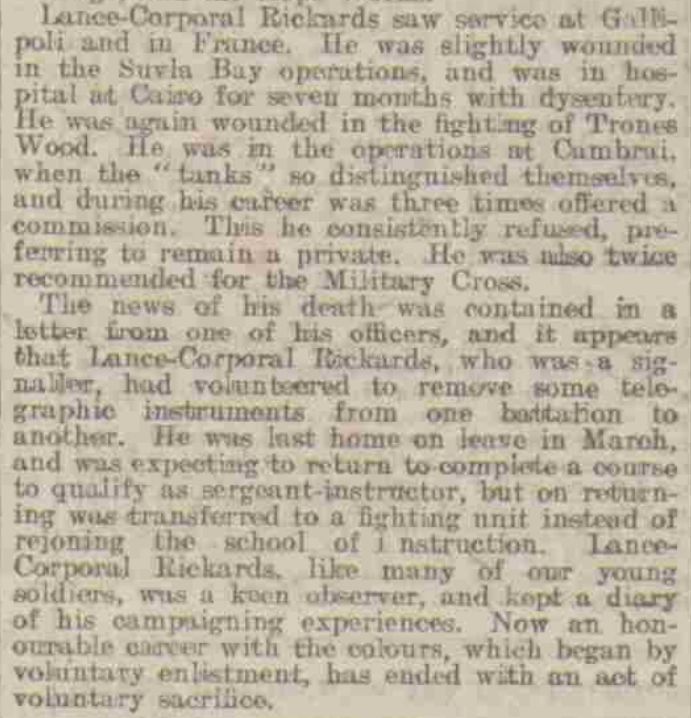 There is a tantalising mention in the above article of Albert having 'kept a diary of his campaigning experiences'. It would be amazing to track this down (and we will try!) An announcement also appeared in the Chronicle's ‘Roll of Honour’ column, from which we know that he was known as 'Bert':
A week later, Albert’s photograph appeared among the many
men of Bath whose deaths were reported in the newspaper. 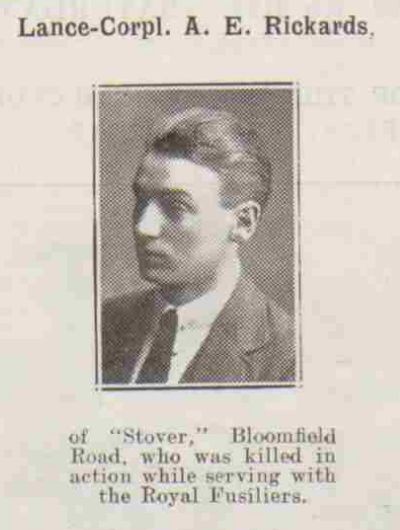 | ||
Burial | ||
EnglebelmerAlbert Rickards is buried at Englebelmer Communal Cemetery Extension, France.From the Commonwealth War Graves Commission: "The
village of Englebelmer was in Allied hand during the whole of the War,
and it was used as a Field Ambulance station; but until the autumn of
1916, and again in the summer of 1918, it was liable to occasional
shelling. It was later "adopted" by the City of Winchester. The Extension was begun in October, 1916, closed in March, 1917, and used again in 1918; and after the Armistice graves were brought from the battlefields immediately North and East of Englebelmer and the following cemeteries:- BEAUSSART COMMUNAL CEMETERY EXTENSION, in a hamlet of Mailly-Maillet, was used at intervals from April, 1916, to May, 1918, and contained the graves of 18 soldiers from the United Kingdom and nine from New Zealand. There are now over 100, 1914-18 war casualties commemorated in this site. Of these, a small number are unidentified and special memorials are erected to two United Kingdom soldiers, buried at Beaussart, whose graves could not be found. " | ||
Decoration | ||
|
Albert would have received the 1914-15 Star, the British War Medal 1914-18 and the Allied Victory Medal posthumously. | ||
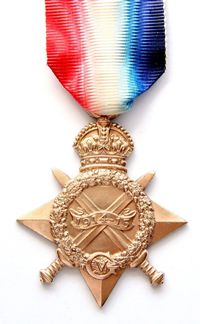 | 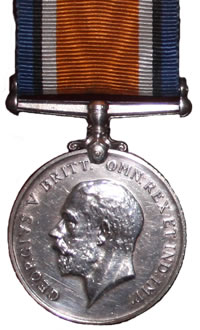 | 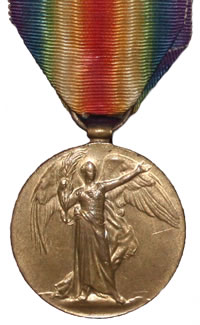 | ||
| 1914-15 Star | British War Medal 1914-18 | Allied Victory Medal |
Commemoration | ||
 In addition to his commemoration on the South Twerton School memorial, Albert Rickards is commemorated as follows: | ||
|
Bath War Memorial See separate page for details of the Bath War Memorial. Albert Rickards' inscription: |
 |
|
Oldfield Park Baptist Church Memorial Albert Rickards is also commemorated in the church with which his family was connected. More information on this page. |
|
St. Luke's Church Memorial Albert Rickards is
also among the names commemorated in his local church of St. Luke in
what was then known as South Lyncombe. Also commemorated on this plaque
are the vicar of the church, Capt Doudney (who died while acting as a
chaplain to the troops at the front in 1915) and the two Captain Hatts,
sons of Bath's mayor. |
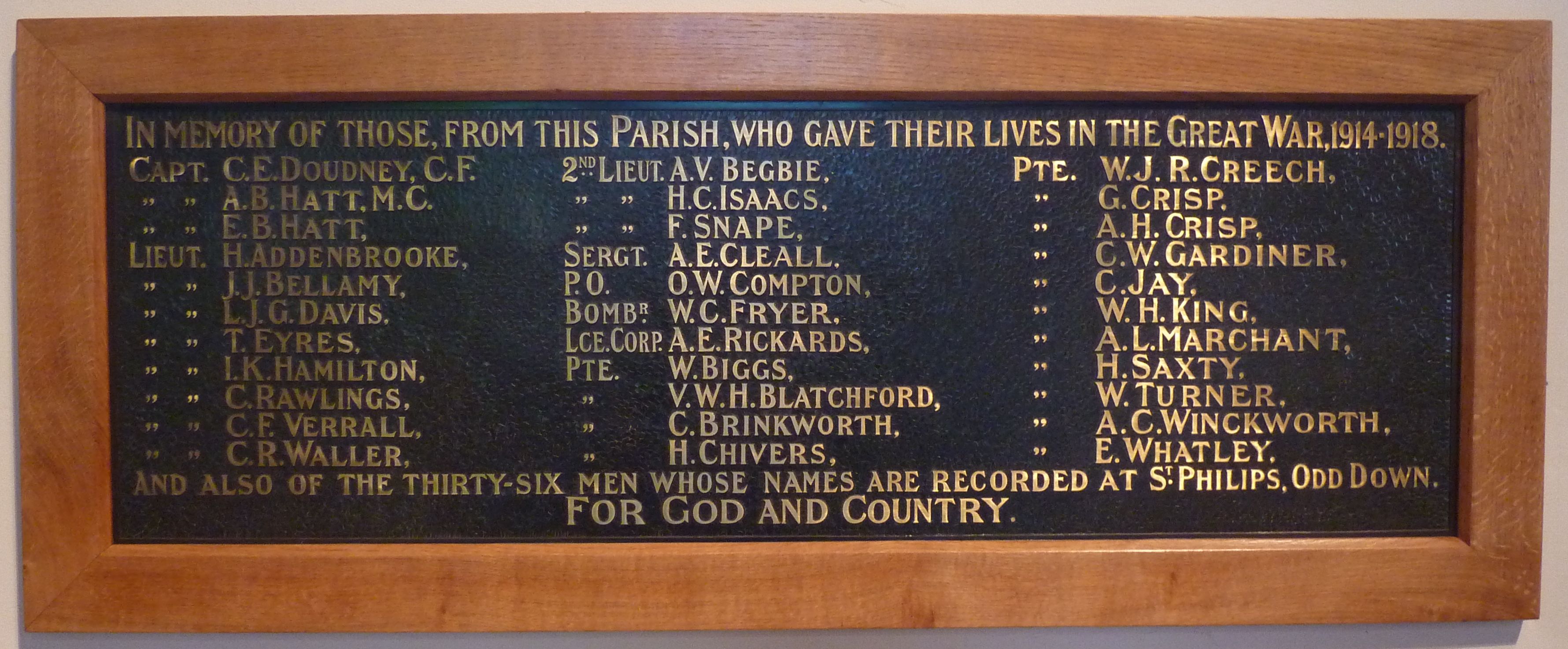 |
| City of Bath Boys School (now at Beechen Cliff School) Having attended the City of Bath Boys (Grammar) School, Albert Rickards is commemorated on this plaque, which is now in the stairwell at Beechen Cliff School at Alexandra Park. |
|
Bath YMCA Memorial, YMCA HQ, Broad St Albert Rickards was commemorated on a plaque which was dedicated and installed at the YMCA in Broad Street in 1920 to honour fallen members. In the intervening years, the YMCA has lost this plaque and another honouring Bath Scouts which was also installed there. See separate page giving details of the YMCA memorial. |
|
'Soldiers Died in the Great War' Note that Albert Rickards' name is mis-spelt as 'Richards' in this official national list of those killed in the war. |
Further Information |
The Family After 1918 |